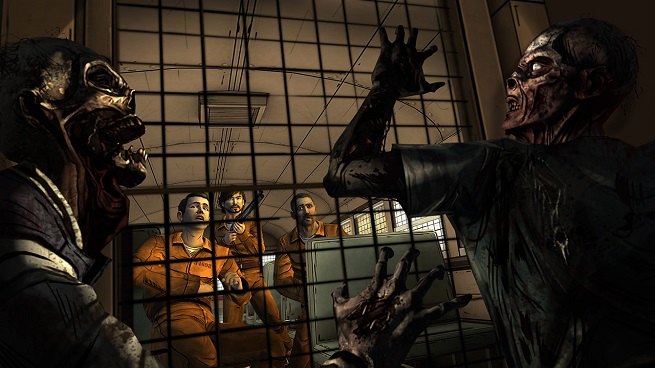Stay on top of all our E3 2013 coverage here.
[aditude-amp id="flyingcarpet" targeting='{"env":"staging","page_type":"article","post_id":757086,"post_type":"story","post_chan":"none","tags":null,"ai":false,"category":"none","all_categories":"games,","session":"D"}']LOS ANGELES — Telltale Games is back with more The Walking Dead, its critically acclaimed episodic point-and-click adventure series (and GamesBeat’s 2012 Game of the Year). The title’s first downloadable content, 400 Days, is coming out in July for $4.99 on PC, Mac, iOS, Xbox Live, and PlayStation Network.
The DLC will serve as a sort of bridge between Season One and Season Two, telling the stories of five survivors in the first 400 days of the zombie apocalypse.
If you never played The Walking Dead, you’ll need at least Episode One of Season One to play 400 Days, but Richard Iggo, Telltale Games’ senior director of marketing, doesn’t recommend playing it without having first finished the entire season.
“First of all, it’s just nice to have that continuity all the way from Season One and experience the world of The Walking Dead,” Iggo explained during a demo at this year’s Electronic Entertainment Expo. “But more importantly, the decisions that you made in Season One will come to echo in 400 Days. And even more importantly, the stuff you choose to do in 400 Days will resonate forward into Season Two.”
400 Days’ five characters each have their own short, playable story, their own perspective of the zombie apocalypse from Day Zero to Day 400. You can play the stories in any order, and they all contain some amount of crossover. Each takes place in the same location, a Georgia truck stop not far from where Season One’s ragtag band of survivors fought their own battles against the undead.
During the E3 demo, Telltale introduced Vincent, who shoots an unknown man for unknown reasons before winding up shackled in a bus on the way to prison. His situation eerily echoes that of Season One protagonist Lee Everett, another criminal on his way to prison before zombies intervene. But Iggo told GamesBeat the similarities are not intentional.
“I don’t think it was an intentional connection other than it’s … with Vincent’s story we wanted to write a real pressure cooker-style environment. All of the other stories are very, very different both in tone and in the type of character you play.
“Even though they’re all linked by this truck stop, some of them are very open, some of them like this one are kind of pressure cooker stories, but they’re very, very different. So it’s not really trying to echo back to Lee — it’s just trying to give you that experience of different viewpoints on the zombie apocalypse.”
[aditude-amp id="medium1" targeting='{"env":"staging","page_type":"article","post_id":757086,"post_type":"story","post_chan":"none","tags":null,"ai":false,"category":"none","all_categories":"games,","session":"D"}']
Throughout the demo, Iggo emphasized that, once again, your choices will matter. Trapped on the prison bus by walkers, Vincent must decide which convict’s foot to blow off with a shotgun to escape. It’s just as brutal as the leg chopping scene of Season One, and it definitely has an impact on the story.
“The thing about 400 Days is that it allows you to definitely explore those things we had in Season One,” Iggo added, “but there are certain ways in which we told the story in Season One from a storytelling and a game dynamic point of view, which kind of wandered into a certain direction. With 400 Days, there were ideas that we had that really couldn’t work in Season One. But now we can explore those different mechanics and different ways of telling a story around an environment. [It’s] different from Season One, but still The Walking Dead you know and love.”

